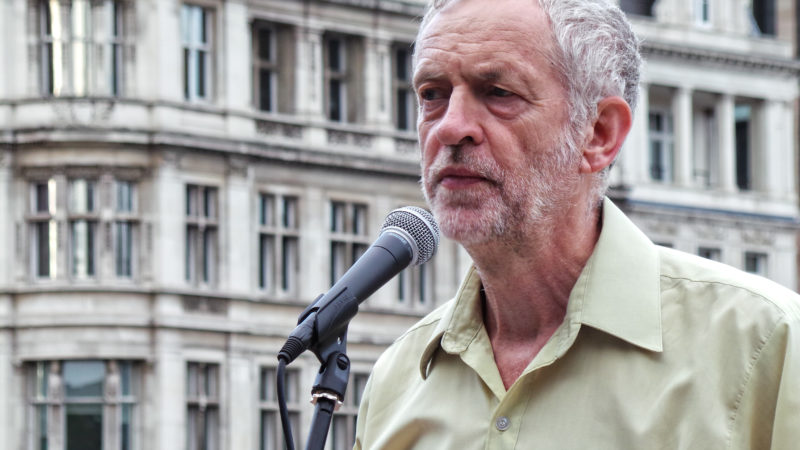Ireland is central to Labour's recent change in tone on Brexit. But further movement is needed to protect a fragile peace on the island.

The last Brexit safe space in politics has gone. Prime Minister’s Questions was, at least when Jeremy Corbyn was speaking, free of the travails of our European departure, thanks largely to the policy of constructive ambiguity.
But with that jettisoned, the Labour leader has – save this week’s focus on Saudi Arabia – been using all of his questions to address Brexit. For the 12 months prior he had been silent on the matter. Well, almost silent: before Christmas he broached the topic twice. The subject of his question on both occasions? Ireland.
Brexit has set two of the themes that have defined Corbyn’s career – Eurosceptisism and Irish republicanism – on a collision course. Their paths had rarely crossed but the risk of a hard border means the two are now irreconcilable. The customs union and single market are ‘capitalist clubs’, but leaving either would necessitate border controls and threaten the peace process.
The importance of the Irish cause for Corbyn should not be underestimated. It has been used to both praise and pillory him. His early advocacy of dialogue with Sinn Fein and the IRA, often held up as an example of his being on the “right side of history”, is well known. As are the grainy, black and white photos of Corbyn and Gerry Adams that were used as apparent proof of terrorist sympathies by the not-so-sympathetic press.
But less well known is the work Corbyn did to help victims of miscarriages of justice in Northern Ireland, or to help overturn the convictions of the Birmingham Six and Guildford Four – going so far as to cover the bail money for one of their number.
Corbyn also backed the London-based republican Troops Out Movement, with whom he was arrested in 1986 while picketing a trial at the Old Bailey.
Of course it was not uncommon wherever there was injustice, or a minority suffering at the hand of a great or foreign power, to find Corbyn with a placard. And Northern Ireland was indeed a cause célèbre for the left in the 1980s. But for the Islington North MP this matter was closer to home.
His constituency covers Holloway, one of the great Irish citadels of London. Any trip to the pub there during that decade would be soundtracked by republican rebel songs. The man Corbyn replaced as its MP was a Catholic railwayman from County Clare. Bloody Sunday commemorations and Troops Out marches would pass through the heart of the constituency along Holloway Road. He backed their cause and they backed him.
But a community that once stood against injustice in Northern Ireland now stands against Brexit and, specifically, a hard border. Corbyn knows the significance of the removal of border controls in Ireland.
In an interview during the 2015 leadership election he acknowledged the role that their removal had played: “You go to Belfast, you go to Dublin, people travel back and forth all the time…there is a sense that there is an island of Ireland,” he said.
The nationalist community in Northern Ireland did not wake up the day after the Good Friday Agreement was signed and no longer care about all the Union Jacks around them or the Queen on their money or the many injustices carried out in the name of the state – the British state – that still ruled them. But the peace deal did enough so that the vast majority were no longer willing to lay down their, or anyone else’s, lives to change the flag that flew over their parliament.
Freedom of movement and erasing any visible trace of the division of the island were paramount in achieving this. It allowed nationalist communities to feel that much closer to those they identified with in the south. Families could travel unimpeded to see relatives. Economic links were forged and effectively an all-island economy was established, one that could not function without the single market.
No one is proposing a return to armed checkpoints and Chinooks, but any visible dividing line, be it customs checks or just freight-scanning cameras, would become a target. Warnings about the threat of dissident violence are not hyperbole.
Though it may not attract headlines in London, dissident activity has never completely gone away in Northern Ireland. Even in mainland Britain, a month before the Brexit referendum the Home Office raised the treat level for a republican attack to “a strong possibility”.
The economic impact, the threat to jobs and the disruption to everyday lives would be further sources of grievance that would undermine what has always been a fragile peace, while the corresponding increase in policing and surveillance would be anathema to what Corbyn has campaigned for.
And keeping Britain or the North in a customs union isn’t enough. Jettisoning the rules of the single market would mean border checks on goods to ensure they met EU standards and regulatory requirements.
The Labour leader has been on a journey with Europe, from hostility to ambivalence to “seven and a half out of ten” support to backing a customs union. Fear of losing Leave-supporting seats had dictated the party’s position on Brexit.
The intractability of the border question may well have been what tipped Corbyn to the latest shift. Whether it takes him to embracing the single market, freedom of movement or even a second referendum remains to be seen.
Patrick J Barrett is a freelance writer and Labour activist.
Left Foot Forward doesn't have the backing of big business or billionaires. We rely on the kind and generous support of ordinary people like you.
You can support hard-hitting journalism that holds the right to account, provides a forum for debate among progressives, and covers the stories the rest of the media ignore. Donate today.



